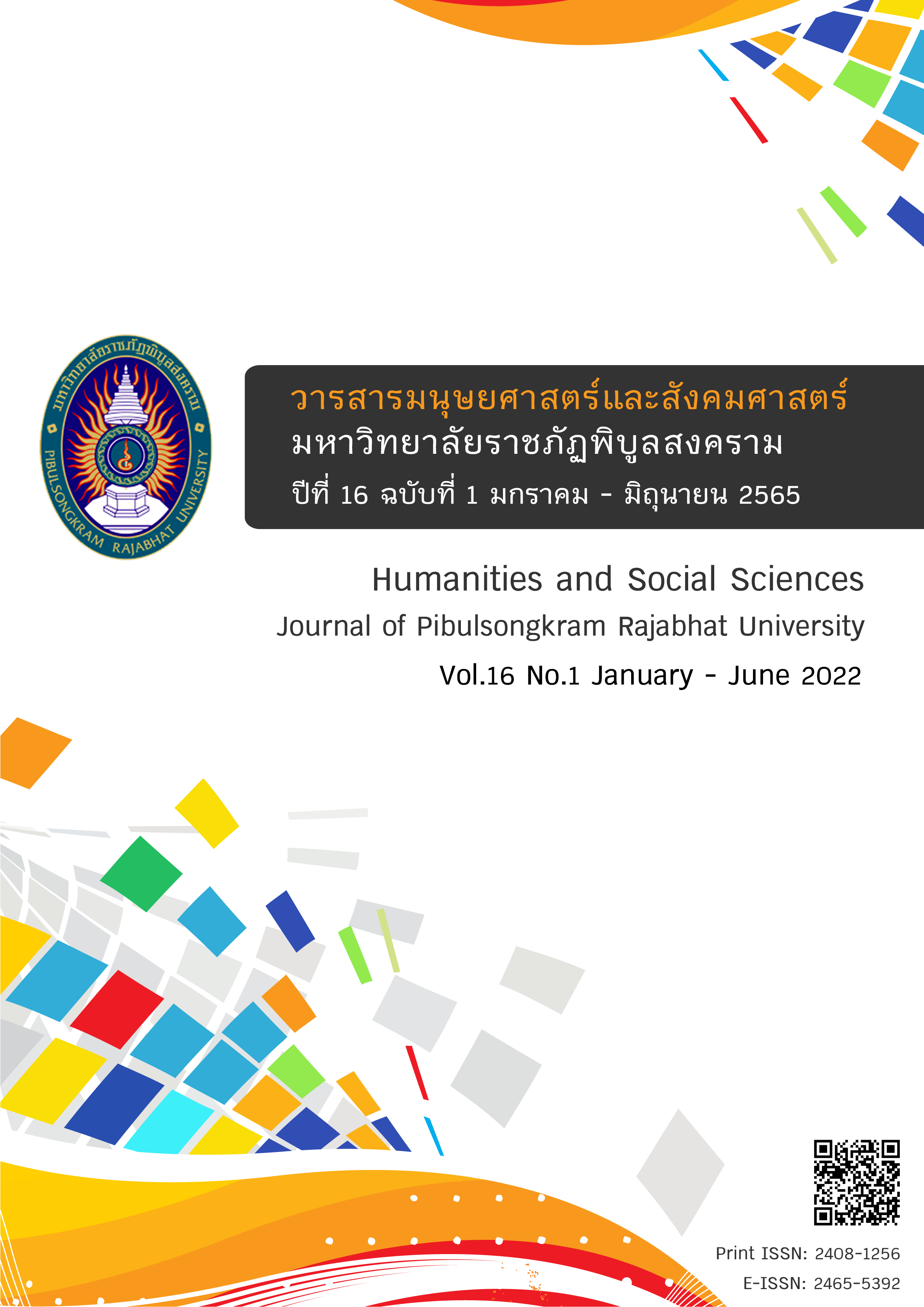Developing Learner Development Activities to Promote the Cross-Cultural Understanding of Grade 4 - 6 Students at Bannonglom School, Phayao Province
DOI:
https://doi.org/10.14456/psruhss.2022.19Keywords:
Learner development activities, Cross-cultural understanding, Respectful mindAbstract
The purposes of this research were to 1) construct and find the quality of learner development activities to promote the cross-cultural understanding of grades 4 - 6 students,
2) study the cross-cultural understanding of the students after learning by the learner development activities to promote the cross-cultural understanding, and 3) study the students’ respectful minds after learning by the developed activities. The population in this research was 44 of grades 4 - 6 students at Bannonglom School, Phayao Province in the academic year 2019. The instruments of this research were 1) learner development evaluation form, 2) lesson plans of learner development activities evaluation form, 3) cross-cultural understanding evaluation form, and 4) respectful mind evaluation form. Data were analyzed by means, percentages, and standard deviations. The research findings were as follow: 1) six elements of learner development activities to promote the cross-cultural understanding and all of 11 lesson plans were a very good level, 2) after learning with this learner development activities, students’ cross-cultural understanding was at a high level, and 3) after learning with this learner development activities, students’ respectful mind were at a high level.
References
เกียรติสุดา ศรีสุข. (2552). ระเบียบวิธีวิจัย. เชียงใหม่: ครองช่างพริ้นติ้ง.
ชญาณ์พัชร ทีสุกะ. (2555). การพัฒนาหลักสูตรท้องถิ่น กลุ่มสาระการเรียนรู้สังคมศึกษา ศาสนาและวัฒนธรรม เรื่อง ถิ่นนี้ศรีสงคราม ชั้นประถมศึกษาปีที่ 5 โรงเรียนบ้านข่า สำนักงานเขตพื้นที่การศึกษาประถมศึกษานครพนม เขต 2 (วิทยานิพนธ์ปริญญามหาบัณฑิต). นครพนม: มหาวิทยาลัยนครพนม.
ชวลิต ชูกำแพง. (2551). การพัฒนาหลักสูตร. มหาสารคาม: มหาวิทยาลัยมหาสารคาม.
บุญชม ศรีสะอาด. (2554). การวิจัยเบื้องต้น (พิมพ์ครั้งที่ 9). กรุงเทพฯ: สุรีวิทยาสาส์น.
วรณัน มีฉวี. (2561). การจัดการเรียนรู้โดยใช้โครงงานเป็นฐานในวิชาเกษตรกรรมเพื่อพัฒนาทักษะการทำงานร่วมกันของนักเรียนชั้นประถมศึกษาปีที่ 6 โรงเรียนบ้านโป่งไฮ จังหวัดเชียงใหม่ (วิทยานิพนธ์ปริญญามหาบัณฑิต). เชียงใหม่: มหาวิทยาลัยเชียงใหม่.
วิจารณ์ พานิช. (2556). การสร้างการเรียนรู้สู่ศตวรรษที่ 21. กรุงเทพฯ: มูลนิธิสยามกัมมา. ส. เจริญการพิมพ์.
ศิริพร ไกรสมสาตร์. (2557). การพัฒนาคุณลักษณะความเป็นพลเมืองดีในมิติการเคารพความแตกต่างของนักเรียนประถมศึกษาปีที่ 6 โดยใช้การเรียนรู้แบบโครงงาน (วิทยานิพนธ์ปริญญามหาบัณฑิต). กรุงเทพฯ: จุฬาลงกรณ์มหาวิทยาลัย.
สมเกียรติ อินทสิงห์. (2563). การบริหารหลักสูตรสถานศึกษา. เชียงใหม่: หน่วยพิมพ์เอกสาร คณะวิทยาศาสตร์ มหาวิทยาลัยเชียงใหม่.
สัญญา สัญญาวิวัฒน์. (2542). ทฤษฎีสังคมวิทยา การสร้าง การประเมินค่า และการใช้ประโยชน์ (พิมพ์ครั้งที่ 4). กรุงเทพฯ: จุฬาลงกรณ์มหาวิทยาลัย.
สำนักวิชาการและมาตรฐานการศึกษา. (2553). แนวทางการจัดกิจกรรมพัฒนาผู้เรียน ตามหลักสูตรแกนกลางการศึกษาขั้นพื้นฐานพุทธศักราช 2551 (พิมพ์ครั้งที่ 2). กรุงเทพฯ: โรงพิมพ์ชุมนุมสหกรณ์การเกษตรแห่งประเทศไทย.
สุรางค์ โค้วตระกูล. (2559). จิตวิทยาการศึกษา (พิมพ์ครั้งที่ 12). กรุงเทพฯ: จุฬาลงกรณ์มหาวิทยาลัย.
อานันท์ กาญจนพันธ์. (2561). ปาฐกถาพิเศษ สังคมพหุวัฒนธรรม. ในสังคมพหุวัฒนธรรม. เชียงใหม่: ศูนย์ล้านนาศึกษา.
Bellanca, J. & Brandt, R. (2010). 21st Century Skills: Rethinking How Students Learn (Leading Edge). U.S.A.: Solution Tree Press.
Gardner, H. (2006). Five minds for the future. Boston, Mass: Harvard Business School Press.
Kruse, S. D., & Gray, J. A. (2019). A case study approach to educational leadership. New York, NY: Routledge.
Tyler, R. W. (1968). Basic Principle of Curriculum and Instruction. Chicago: The University of Chicago Press.
Downloads
Published
How to Cite
Issue
Section
License
Copyright (c) 2020 Humanities and Social Sciences Journal of Pibulsongkram Rajabhat University

This work is licensed under a Creative Commons Attribution-NonCommercial-NoDerivatives 4.0 International License.
Any articles or comments appearing in the Journal of Humanities and Social Sciences, Rajabhat Phibulsongkram University, are the intellectual property of the authors, and do not necessarily reflect the views of the editorial board. Published articles are copyrighted by the Journal of Humanities and Social Sciences, Rajabhat Phibulsongkram University.









